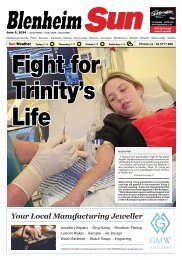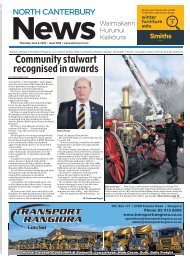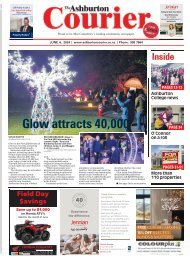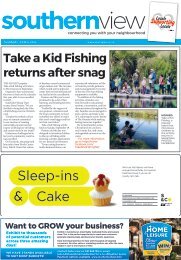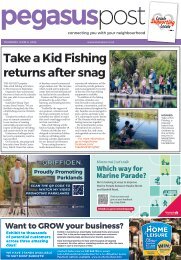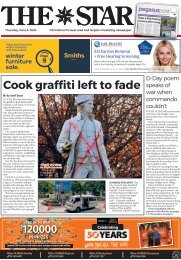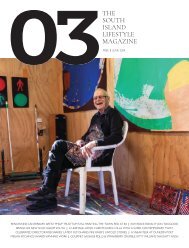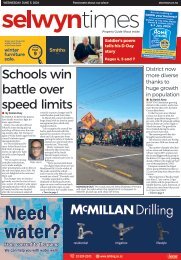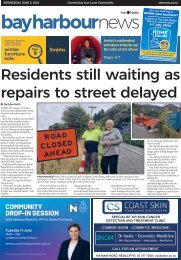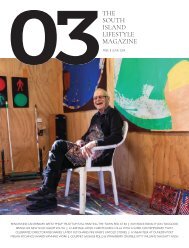The Star: May 31, 2018
You also want an ePaper? Increase the reach of your titles
YUMPU automatically turns print PDFs into web optimized ePapers that Google loves.
Community<br />
5<br />
In early 2019, University of Canterbury<br />
researchers will be part of an international<br />
effort to explore one of the coldest,<br />
harshest and most remote locations in the<br />
world: the Weddell Sea off Antarctica.<br />
In January and February 2019, a major,<br />
45-day, international scientific expedition<br />
– the Weddell Sea Expedition 2019 –<br />
aims to survey sea ice, the underside of<br />
the Larsen C Ice Shelf, document the<br />
rich and little-studied marine life of the<br />
western Weddell Sea ecosystem, and<br />
locate the wreck of Sir Ernest Shackleton’s<br />
ship ‘Endurance’, which was trapped and<br />
crushed by the ice and sank there in 1915.<br />
An international team of researchers<br />
from the University of Canterbury<br />
(UC), the University of Cambridge,<br />
the Nekton Foundation, and two<br />
South African universities – including<br />
glaciologists, marine geologists, marine<br />
biologists, oceanographers and marine<br />
archaeologists – will use autonomous<br />
underwater vehicles (AUVs) to<br />
survey the sea floor down to<br />
beyond 3,000 metres, study<br />
cavities on the underside<br />
of the ice shelf, and<br />
search for the wreck of<br />
the ‘Endurance’.<br />
UC Glaciologist<br />
and Remote Sensing<br />
expert, Associate<br />
Professor Wolfgang<br />
Rack of Gateway<br />
Antarctica, UC’s<br />
Centre for Antarctic<br />
Studies and Research,<br />
will be a vital part of the<br />
expedition.<br />
“<strong>The</strong> international science<br />
community noticed our knowhow,<br />
and that’s why we were invited to<br />
participate in this icebreaker cruise. It<br />
is great recognition for New Zealand’s<br />
scientific achievements and ability.”<br />
Co-ordinating with the underwater<br />
research and survey work, Professor Rack<br />
and his UC Gateway Antarctica team, will<br />
use specially equipped aerial drones to<br />
measure sea ice thickness and snow depth,<br />
and will also assist with the navigation<br />
of the ‘S.A. Agulhas II’ through the<br />
pack ice in the Weddell Sea. <strong>The</strong> drone<br />
measurements will be coordinated with<br />
data from an upward-looking AUV to<br />
give a better understanding of the sea ice.<br />
<strong>The</strong> UC drones will be operated by a pilot<br />
from UC’s Spatial Engineering Research<br />
Centre.<br />
“As part of the Deep South National<br />
Science Challenge, the Spatial Engineering<br />
Research Centre at UC developed a drone<br />
radar prototype with Lincoln Agritech<br />
which allows us to measure snow on sea<br />
ice. This is key to estimating ice thickness<br />
using satellites, which is what we are going<br />
to test during this scientific expedition,”<br />
Professor Rack says.<br />
Antarctica has about 1.5 million square<br />
kilometres of floating ice shelves, which<br />
have been surveyed and studied from<br />
above, but only very rarely from beneath.<br />
Many of these ice shelves are thinning and<br />
UC SCIENtIStS<br />
INvItED oN<br />
International Antarctic<br />
Expedition<br />
retreating rapidly, possibly impacting sea<br />
ice, and making scientific investigations<br />
here very timely. <strong>The</strong> Larsen A and B ice<br />
shelves collapsed suddenly in a matter of<br />
days in 1995 and 2002, respectively, and<br />
one of the biggest iceberg calving events<br />
ever recorded took place from Larsen C<br />
Ice Shelf in July 2017. Sea ice extent in<br />
this area seems to be stable, seemingly<br />
a climate paradox which is going to be<br />
investigated during this voyage.<br />
<strong>The</strong> Weddell Sea has been nominated<br />
as a large, international Marine Protected<br />
Area, so the expedition will gather vital<br />
baseline data on the rare and little-studied<br />
species which inhabit this icy ecosystem,<br />
as well as studying the key physical<br />
processes driving changes in the region’s<br />
sea ice, ocean currents and the fringing ice<br />
shelves.<br />
Funded by a charitable trust in<br />
the Netherlands, <strong>The</strong> Flotilla<br />
Foundation, the Weddell<br />
Sea Expedition 2019<br />
has a pioneering<br />
programme of science<br />
and exploration<br />
planned, led by<br />
Professor Julian<br />
Dowdeswell, Director<br />
of the Scott Polar<br />
Research Institute at<br />
Cambridge University,<br />
who visited UC earlier<br />
this year as a Cambridge<br />
Visiting Fellow.<br />
“This expedition will give us an<br />
unprecedented opportunity to investigate<br />
and explore the complex interplay<br />
between ice shelves, sea ice, and ocean in<br />
one of the most remote, and least studied<br />
places on our planet,” Professor Rack says.<br />
<strong>The</strong> Weddell Sea Expedition 2019 aims<br />
to inspire young people about science,<br />
engineering and technology, and the<br />
protection of Antarctica, and is partnering<br />
with the Royal Geographical Society to<br />
ensure that the expedition’s research and<br />
findings are disseminated as widely as<br />
possible to schools and students around<br />
the world.<br />
About gateway<br />
Antarctica<br />
Gateway Antarctica is the Centre for<br />
Antarctic Studies and Research at the<br />
University of Canterbury. <strong>The</strong> centre<br />
plays a leading role in national and<br />
international Antarctic research projects.<br />
This includes areas such as engineering in<br />
extreme environments, Antarctica’s role<br />
in climate change, connections between<br />
Antarctica and New Zealand and human<br />
influences in and on Antarctica.<br />
Dentures not fitting properly?<br />
When those of us of a certain<br />
age were making regular<br />
visits to the ‘murder<br />
house’ to get our<br />
teeth filled, it never<br />
occurred to anyone in<br />
the dental industry<br />
that we would still<br />
have our own teeth<br />
50+ years later.<br />
After all, many of<br />
our own parents were<br />
sporting full or partial<br />
dentures already!<br />
But the reality is that a<br />
surprising number of us are<br />
entering our latter years with all our<br />
own teeth, and that’s great news. But the<br />
downside is that the rate of tooth decay<br />
in people over 65 now outpaces that of<br />
schoolchildren.<br />
Teeth are amazingly strong, but they’re<br />
not indestructible – and a lifetime of<br />
crunching gnawing and grinding, not<br />
ARE yoUR tEEtH<br />
AgEINg<br />
as well as you are?<br />
SoLUtIoNS PUzzLES fRom PAgE 4<br />
EASy<br />
qUICk CRoSSWoRD<br />
mEDIUm<br />
to mention exposure to acidic<br />
foods, can take its toll.<br />
So good oral hygience<br />
becomes even more<br />
important as the years<br />
go by. Fortunately<br />
these days we all<br />
have access to good<br />
quality toothpastes<br />
and brushes. And<br />
if arthritis or other<br />
conditions make<br />
brushing difficult, an<br />
electric toothbrush can<br />
be an excellent option.<br />
But often, despite our best<br />
efforts, the inevitable happens and<br />
there is a need for full or partial dentures.<br />
Again, the advances in technology have<br />
resulted in significantly improved choices,<br />
which mean that not only do dentures<br />
look more natural than in the past,<br />
they fit better too. So, as we promise at<br />
Duchenne, you can still eat, talk and smile<br />
with confidence!<br />
Ill-fitting dentures can affect your teeth and mouth,<br />
make eating difficult, and just plain hurt!<br />
We can reline your dentures for optimal fit and<br />
comfort, and you’ll be surprised how quick and<br />
convenient the entire process is.<br />
0800 866 8448 duchenne.co.nz<br />
Mention Forward 50 when you book your<br />
appointment and pay $399 (normally $450)<br />
for a denture reline*<br />
*Only available at selected branches.




